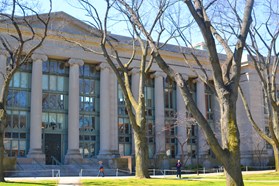
What's being an attorney really like? The truth's more elusive than Nessie herself...
This law business all seems a bit scary. At least, that's what you'd think if you heard some people tell it. Horror stories range from associates being chained to their desks for every waking hour, to senior attorneys screaming at their young charges for minor grammar mistakes – then there's the corporate-personality straitjacket you'll have to don to effectively serve the firm machine.
We've got great news for you: BigLaw isn't one terrible dystopian nightmare. The above is some parts inaccurate, others exaggerated, and a little more utter codswallop/balderdash/hogwash.
So where do these misconceptions come from? The legal profession is extremely nebulous – its size, variety, competitiveness and huge sacks of cash provide fertile ground for rumor and half-truths to grow big and tall.
Allow us to bring some clarity to the situation: drawing on thousands of interviews with associates, here's our take on some of the most common myths surrounding BigLaw.
Myth: Firms only consider law school prestige when comparing applicants.
 Truth: It goes without saying that top firms gravitate towards top law schools, but every firm aims for some degree of diversity within their associate class. One of the easiest ways to achieve that is casting a wide net geographically. Offices in states that aren't New York or California are particularly likely to recruit from local schools.
Truth: It goes without saying that top firms gravitate towards top law schools, but every firm aims for some degree of diversity within their associate class. One of the easiest ways to achieve that is casting a wide net geographically. Offices in states that aren't New York or California are particularly likely to recruit from local schools.
So don't get hung up on the top 14 law schools. National and international firms attend OCIs around 30 or 35 schools on average, plus some careers fairs. They're not going to waste their time visiting a school without considering it a potential recruiting ground. If you find a firm you're interested in, do some research to see if there are any alumni from your school (or schools you're considering) there and get in touch.
Myth: Candidates should hide or disguise their personalities to get hired.
Truth: The exact opposite. From the outside law firms might seem like monolithic entities looking for faceless robots to chew up and spit out, but law is a people industry. Don't ever forget that. EQ matters as much as IQ, and you're special. Someone who's fun to spend time with and has something aside from spreadsheets to talk about over a morning coffee will do well for themselves. A junior at one of the country's top firms told us “it's important you show you're a normal person with life experience to bring to the table. We like to see personality in candidates.”
"The wonders of technology increasingly mean associates don't need to be in the office to work."
Myth: You'll be in the office working all day every day.
 Truth: BigLaw is a spectrum. Law in general: even moreso. Let's start with the rough stuff. Late nights happen and can sometimes stretch on for weeks or months. The biggest law firms all require attorneys to work past bedtime, let alone suppertime, on occasion. All nighters don't stop in law school either. Many of the associates we speak to find that their 'normal' schedules and social lives suffer as a result.
Truth: BigLaw is a spectrum. Law in general: even moreso. Let's start with the rough stuff. Late nights happen and can sometimes stretch on for weeks or months. The biggest law firms all require attorneys to work past bedtime, let alone suppertime, on occasion. All nighters don't stop in law school either. Many of the associates we speak to find that their 'normal' schedules and social lives suffer as a result.
Some practice groups tend to be more demanding than others – M&A is perhaps the most temperamental – but even corporate work comes with chances to take a break and head home at 5pm alongside the late night slogs in conference rooms. Most juniors will have to work at least some weekends. For the difference between firms - read the Inside View.
But the wonders of technology increasingly mean associates don't need to be in the office to work any more. Each year we hear more and more about firms pushing flexible working, and the most forward-thinking giving juniors a tech fund to build a home office. Cynical readers might argue this means work really can be 24/7, but mobile phones have had lawyers on-call for decades now – the benefit of family contact and cosier surroundings when attorneys want/need to tie up some loose ends after hours is more significant.
Myth: TV's Suits is a good representation of the law.
 Truth: Sorry folks. Highly entertaining it may be, but the USA Network's flagship drama isn't the most realistic depiction of how lawyers do their thing.
Truth: Sorry folks. Highly entertaining it may be, but the USA Network's flagship drama isn't the most realistic depiction of how lawyers do their thing.
The tangle of personal and professional lives that surrounds Zane Specter Litt and Pearson Hardman is a million times more theatrical than anything you're likely to find within the walls of a real life law firm. And that's to say nothing of the pristine empty desks in every other shot – even in the 21st century, there's plenty of paperwork in every lawyer’s life.
"One of the biggest priorities for firms at OCIs is weeding out jerks."
Myth: Associates are all out to get each other.
Truth: Though they might get to work one-to-one with a partner, every associate will spend much more time rubbing shoulders with those at a similar level to them. Young lawyers are smart people who know that the best way to get the job done well means collaborating with other junior associates.
Bad eggs are only as common as in any other occasionally stressful workplace. One of the biggest priorities for firms at OCIs is weeding out jerks – “even at the callback lunches people are judging you” according to insiders at a prestigious New York firm. Being competitive, not being a team-player, as in any workplace, will not win you praise.
Myth: Partners love to yell at associates.
Truth: Going simply by the fortitude of the associates we've spoken to, we're confident that associates wouldn't stand for this practice. Then there's the fact that our interviewees at firm after firm have told us with pride that theirs isn't home to “screamers” and that publicly reprimanding younger attorneys wouldn't be considered acceptable. Maybe it was more common in the old days, but law firms are investing a lot of time and money into junior associates – this isn't Hell's Kitchen, and demeaning the legal talent of tomorrow is not going to help a firm.
Myth: Leaving a firm is seen as a betrayal.
 Truth: Senior attorneys know full well that not every associate wants to stay at their firm forever or even long-term. If an outgoing associate lands an in-house legal job, or a spell in government, they'll gain potentially invaluable contacts and experience they couldn't get in private practice. Should they return to the firm, as happens frequently – that's a win for the firm. Many even host alumni events and actively advertize opportunities to jump ship.
Truth: Senior attorneys know full well that not every associate wants to stay at their firm forever or even long-term. If an outgoing associate lands an in-house legal job, or a spell in government, they'll gain potentially invaluable contacts and experience they couldn't get in private practice. Should they return to the firm, as happens frequently – that's a win for the firm. Many even host alumni events and actively advertize opportunities to jump ship.
Myth: There's no place at the top for diverse attorneys.
Truth: It's true that white men make up a far larger chunk of BigLaw's biggest players than a true meritocracy should allow for. This is not right, and it's not good. But being female, a minority, LGBT or otherwise won't necessarily preclude you from making partner at a big firm. The partnership ranks at most firms are, even if very slowly, becoming more diverse.
Marci Eisenstein, Schiff Hardin's first female managing partner, told us “there is an increasing number of female role models and mentors who are succeeding at law firms. And, as or more importantly, a growing number of our clients’ decisions are being made by female and diverse leaders who want to provide opportunities to diverse lawyers who are committed, engaged and substantively skilled.”
Myth: Being successful in law means being a legal encyclopedia.
 Truth: Technical detail is part of it, sure. But the function of the lawyer is keeping clients happy, and that involves more than the black and white of legal textbooks. The best lawyers of today and tomorrow serve as treasured commercial strategists, project managers and advisers, not to mention 'rainmakers' who win new work. “It's really important lawyers understand not only the legal world but the world of their clients” says Arnold & Porter chairman Richard Alexander. “Young lawyers need to invest in client relationships in all the ways they can."
Truth: Technical detail is part of it, sure. But the function of the lawyer is keeping clients happy, and that involves more than the black and white of legal textbooks. The best lawyers of today and tomorrow serve as treasured commercial strategists, project managers and advisers, not to mention 'rainmakers' who win new work. “It's really important lawyers understand not only the legal world but the world of their clients” says Arnold & Porter chairman Richard Alexander. “Young lawyers need to invest in client relationships in all the ways they can."
We hope this has helped shine a light on the truth behind the legal profession, but there's so much more to cover – if you'd like us to tackle something in particular you can find us on Twitter, Facebook or Linkedin. See you there!